The missing piece to a major bikeway in downtown Portland that has been over 15 years in the making was lowered into place this morning. Just after 7:00 am Saturday crews with Wildish Construction (the same company that build the Gibbs Pedestrian Bridge under the Aerial Tram) operating two massive cranes lifted the 355,000 pound, 200-foot long Flanders Crossing Bridge into its place across Interstate 405.
It was a perfectly clear and sunny day, a good omen for the future.
Flanders Crossing is the pièce de résistance of the “Flanders Bike Boulevard” first promised to Portlanders in 2005 (see below). Now referred to as the Flanders Neighborhood Greenway project, the vision is to create a low-stress, east-west connection between the Willamette River and NW 24th Avenue where bicycle users, walkers, and rollers of all types have priority. That vision has been on hold in large part because of the gap in the route at I-405.
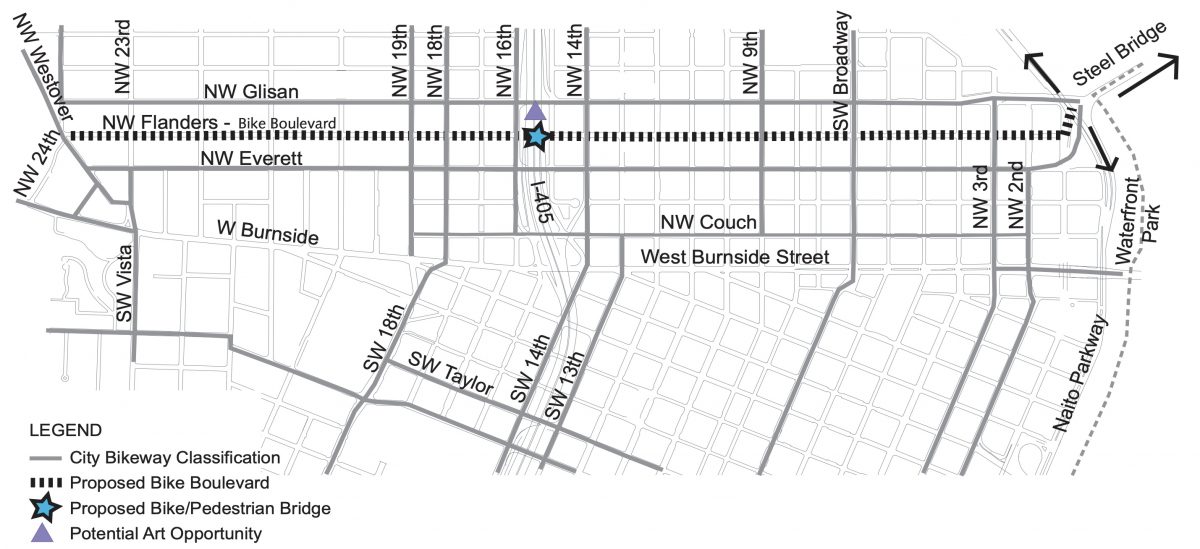
Advertisement
With the bridge in place, the bikeway has been born and in about eight weeks we’ll start to see the vision become a reality. Once the bridge and bikeway are complete, Flanders will (hopefully!) become something that’s much too rare in Portland: A dense street full of commercial destination where bicycle riders feel safe and welcome.
At the site today many people gathered to catch a glimpse of the historic installation. We hoped to see it get moved across the interstate, but crews got a much earlier start than expected and the span was mostly in place before 7:30 am. Luckily Anna Bjornberg (with Go By Bike) was there to grab a few photos of the action (below).
One nearby resident named Geoff who was walking by with his young daughter on roller skates was thrilled to see it in place. “Any time we want to get into the Pearl or get to Powell’s or Whole Foods, we had to go a few blocks out of the way. So this will be a game changer.”
Not only is this bridge the key to the Flanders bikeway, it’s also going to be much safer and more pleasant than any other option. Glisan and Everett (streets one block in each direction) are both very high-stress for walking and biking and lack adequate space and protection for non-drivers. “The only other option is Burnside which is problematic,” Geoff shared. “Or Johnson and sometimes it’s sketchy down there.” His daughter is excited too. “It looks cool. It looks skatable,” she said, with a big smile.
Advertisement
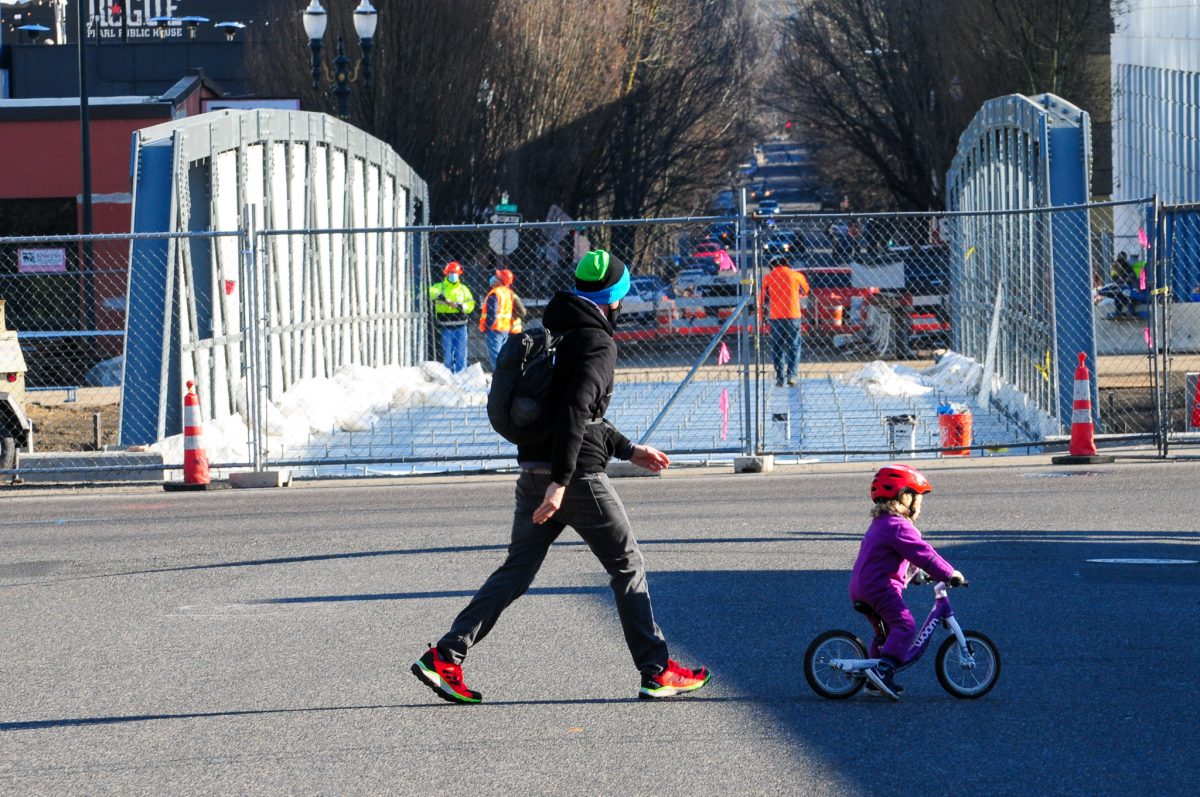
Another couple I spoke to was less enthusiastic. “This is a total waste of money,” a man said (he didn’t share his name). “There are homeless people everywhere, we should have used this money to build a condo to put them in! This is why Trump gets elected because people see liberal cities doing stuff like this!” A woman he was with was also peeved by what she saw. “Is this really necessary?” she wondered. “I mean, I don’t see a lot of bikers around here.” After I offered some different perspectives, their views softened. “Well, I’m sure we’ll use it. It’s probably for the best,” the man said, calming down a bit.
The bridge deck is 24-feet wide and the sides are covered with a steel mesh. In person the mesh looks a lot less transparent than PBOT’s concept drawings, but a great view from the bridge is still likely. Still to come is concrete for the bridge deck and new traffic signals and crossing updates on both ends. On the east side of the bridge, a signal will be installed at NW 14th (at 10 Barrel Brewing) and there will be a new four-way stop sign at 15th. On the west side, a new signal is coming to 16th. The cost of the bridge is $9.5 million paid for through a combination of an Oregon State Lottery grant (via the Connect Oregon program) and Transportation System Development Charges (TSDCs).
Once everything’s in place, figures from the city’s state grant application say bridge crossings will reach over 9,000 per day — that’s more than the Hawthorne Bridge and five times the daily bike ridership of the Tilikum Crossing bridge. By 2035, the number of daily crossings are projected to climb to 11,600.
With a late March opening planned, the Portland Bureau of Transportation is eager to have everything in place to capitalize on all the excitement. This high-profile piece of infrastructure will help rescue our brand as a leading transportation city. It also has the potential to spur economic activity and build community bonds as a Covid-safe place for people to be outside, together, in the heart of Portland.
For a city in dire need of an injection of hope and good news, this bridge will carry more than just people. It’s a powerful symbol that despite everything, Portland can still accomplish big things.
“That’s just so great,” said one woman to her friend as she walked by today. “Yeah,” her friend replied. “Sometimes this city actually does work.”
— Jonathan Maus: (503) 706-8804, @jonathan_maus on Twitter and jonathan@bikeportland.org
— Get our headlines delivered to your inbox.
— Support this independent community media outlet with a one-time contribution or monthly subscription.



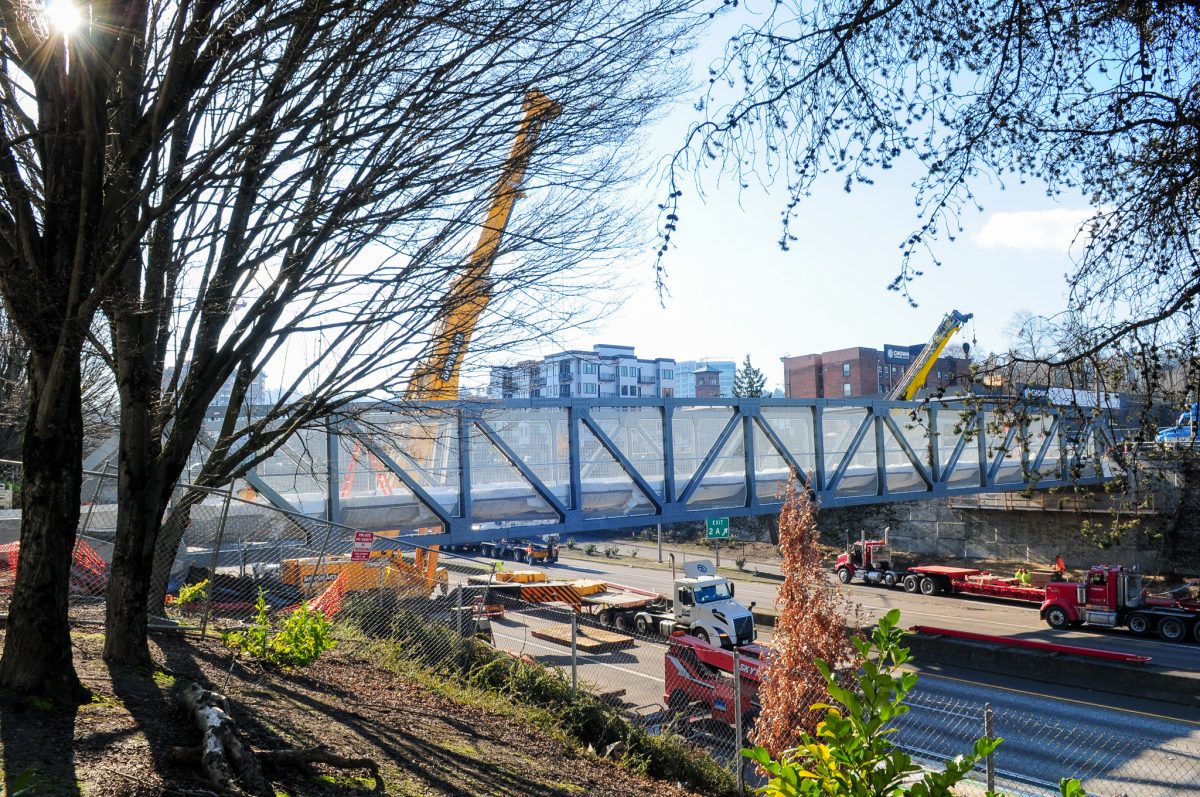

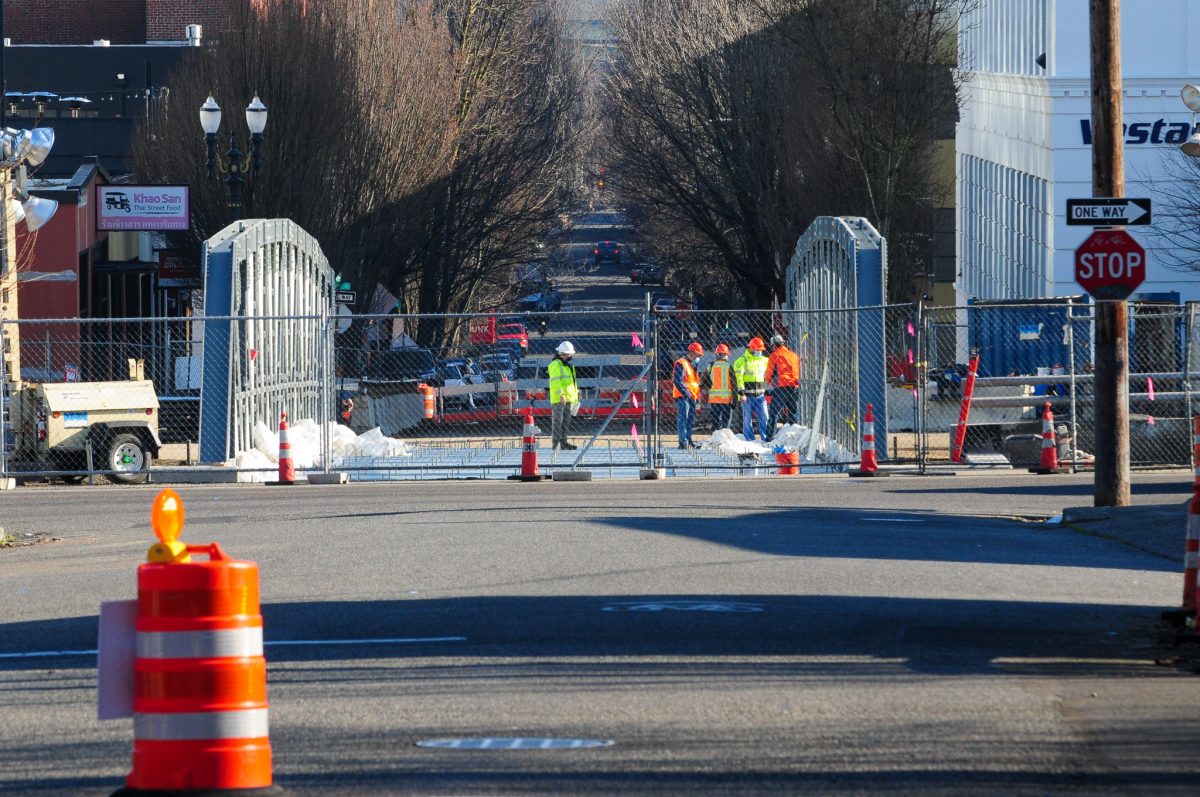


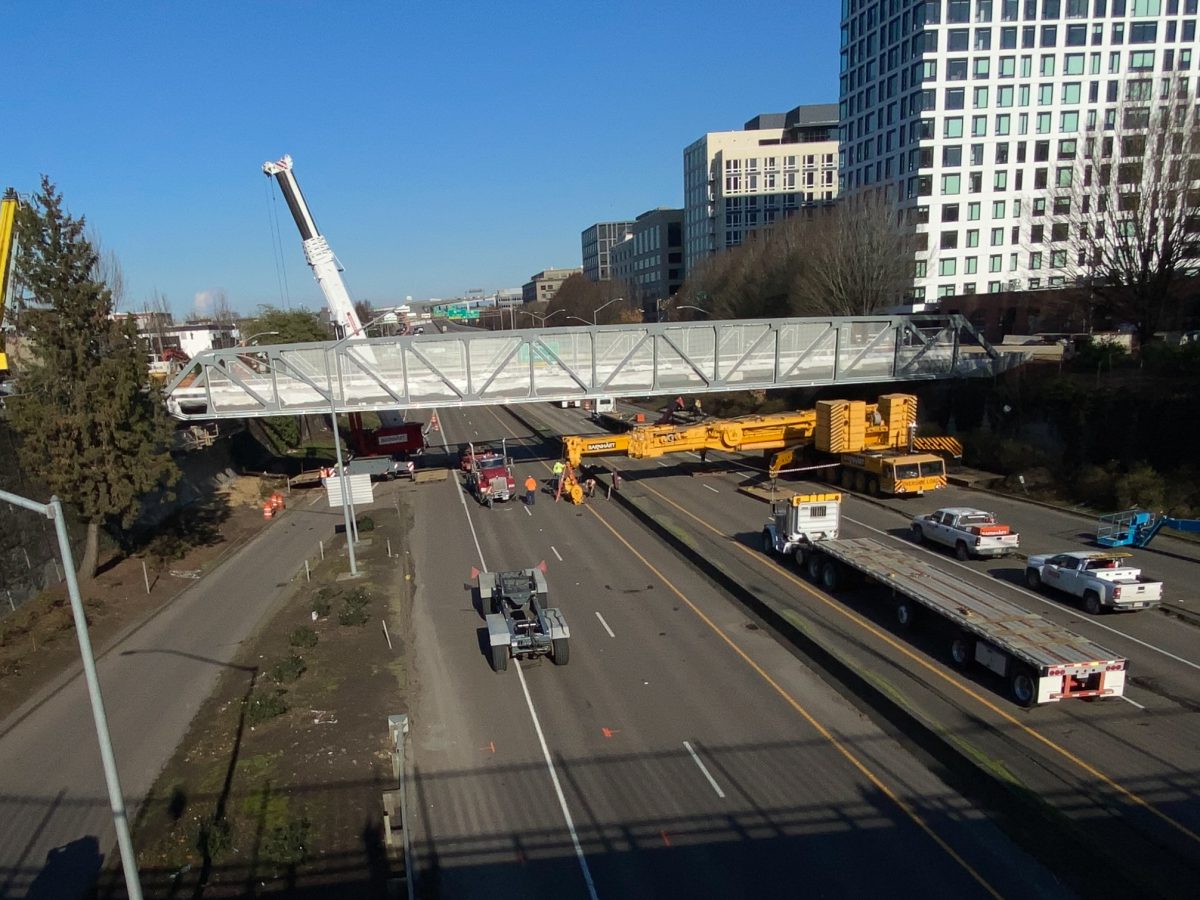
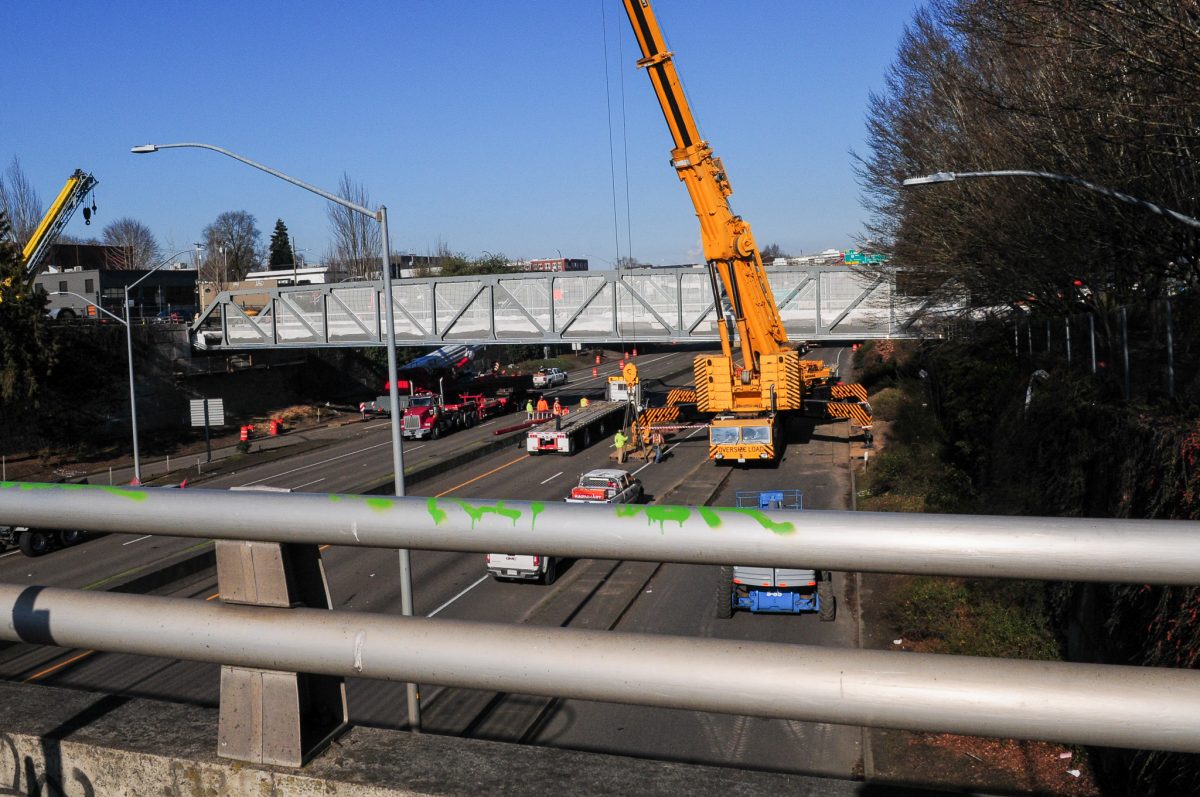
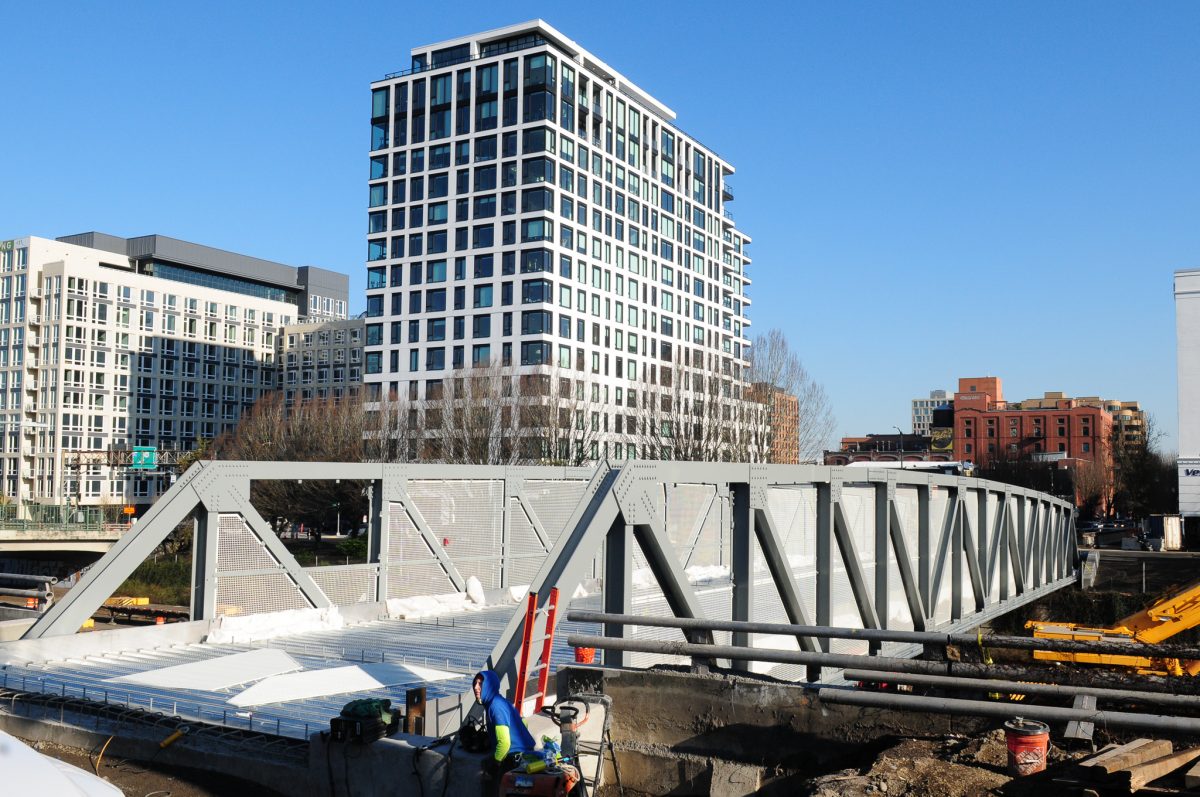
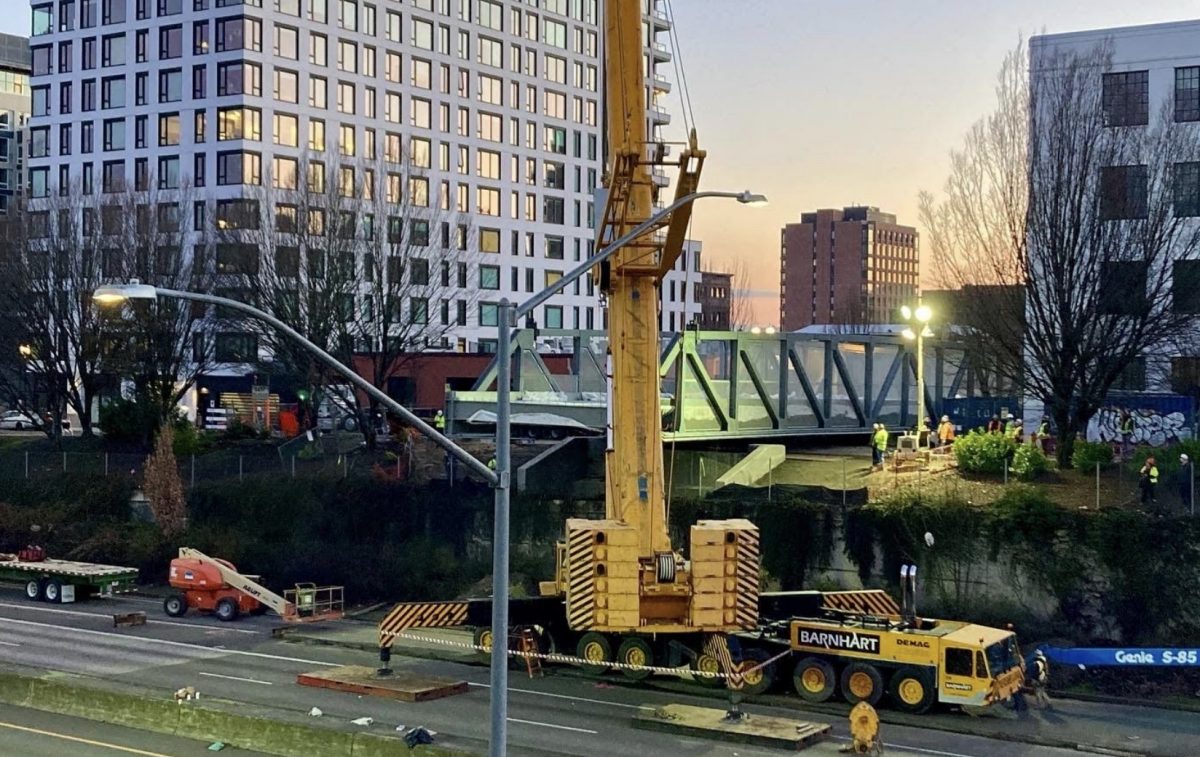
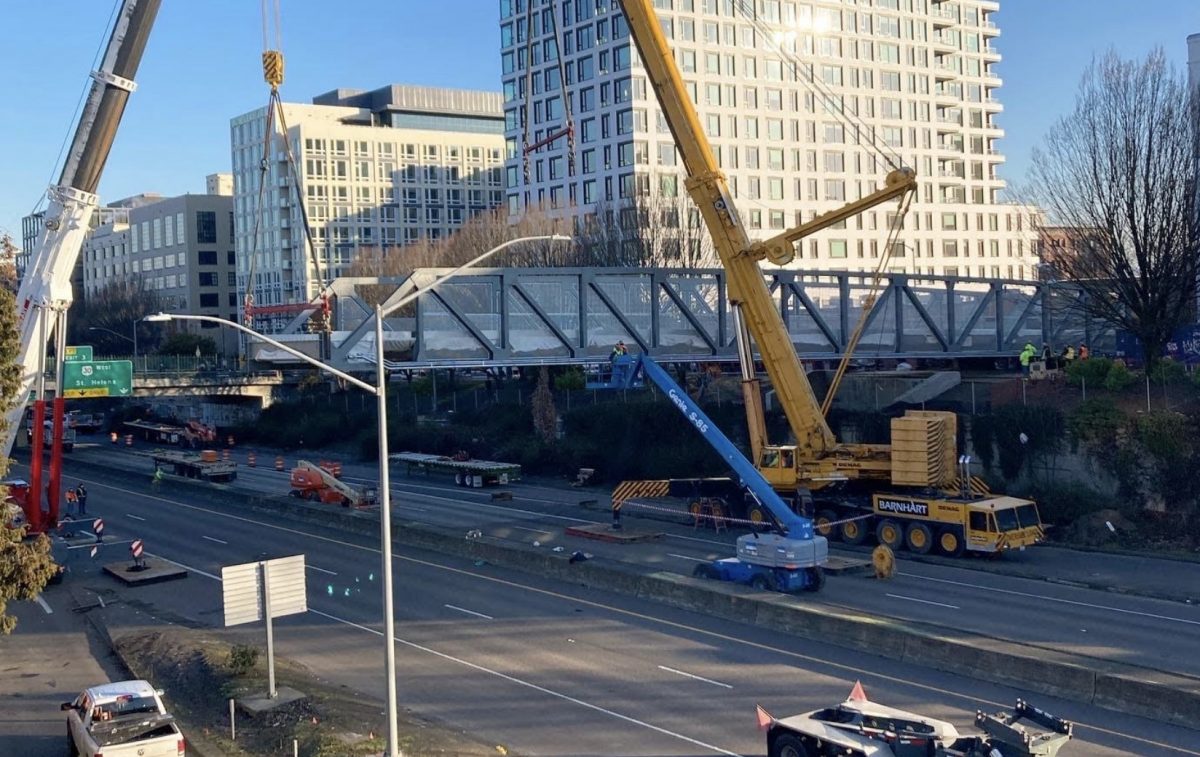
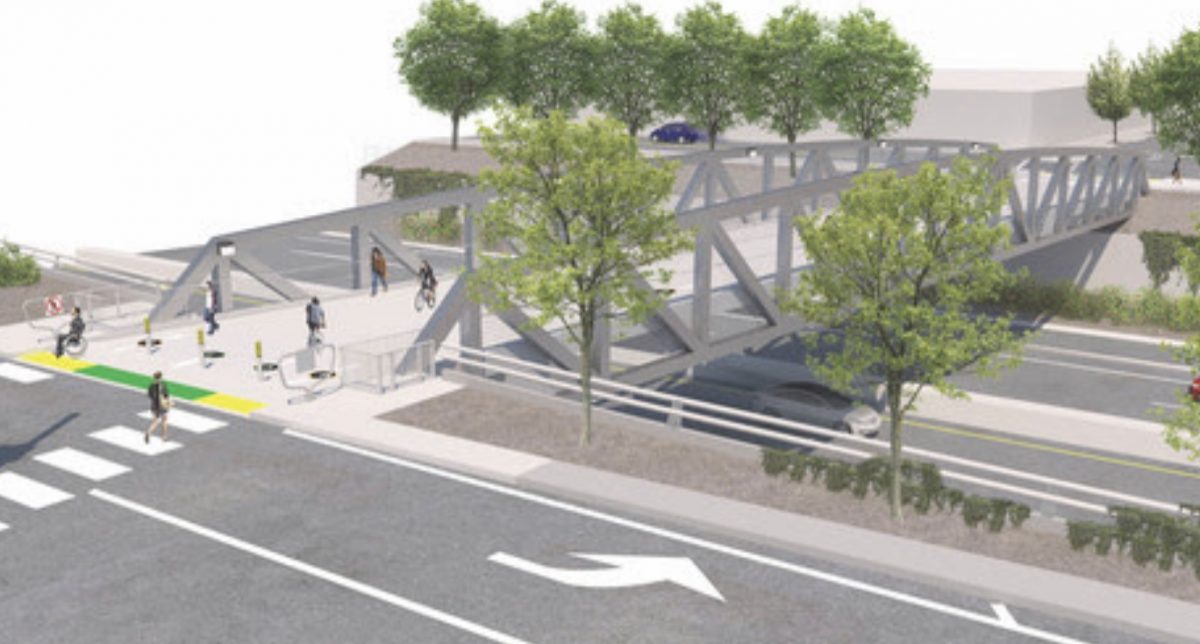
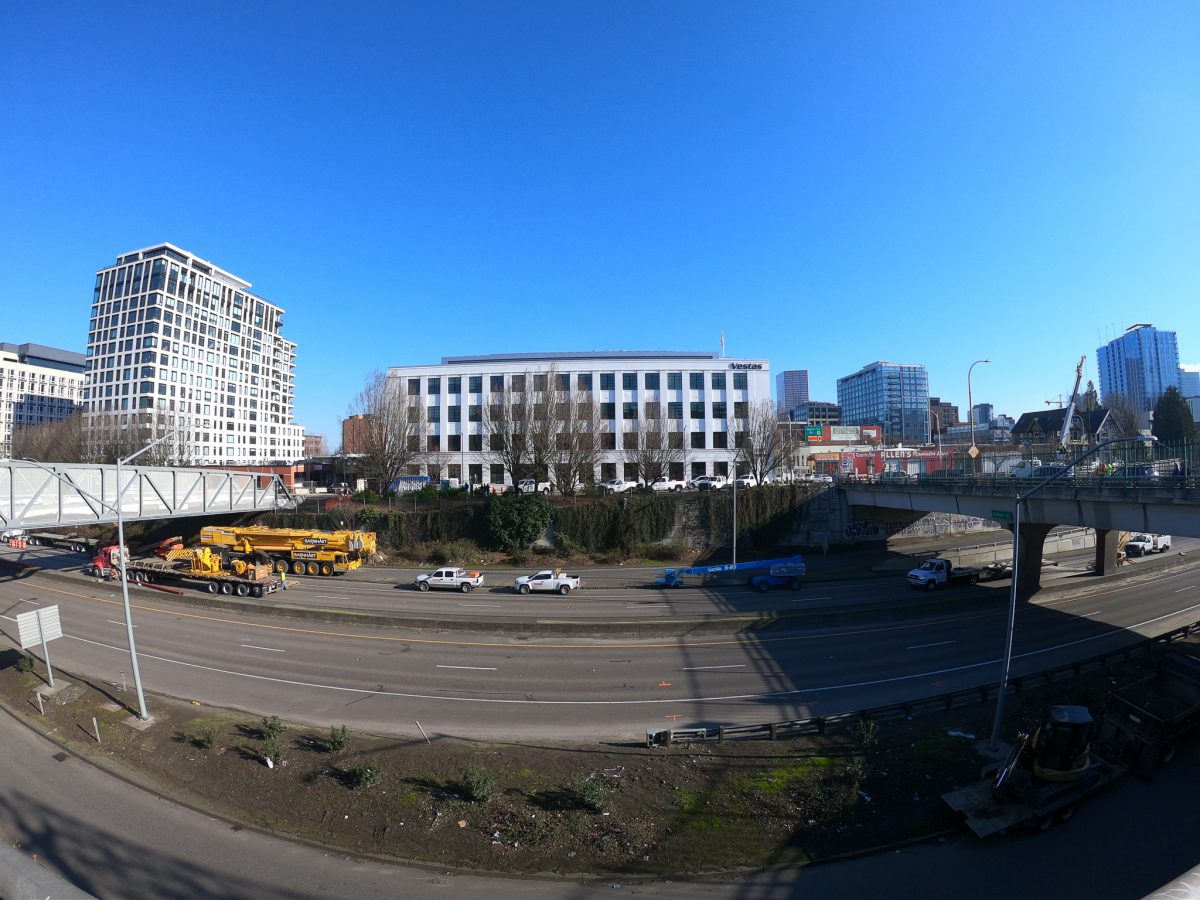
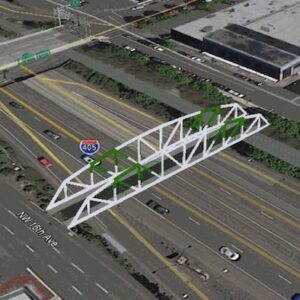
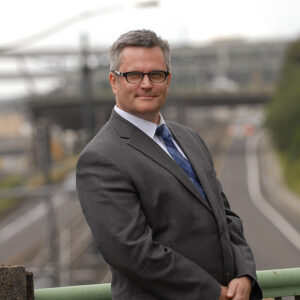
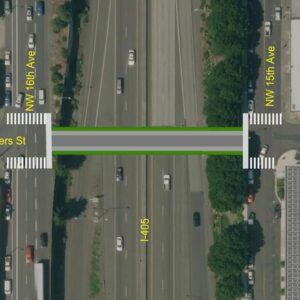
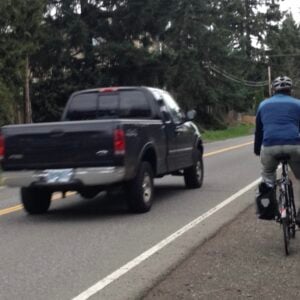
Thanks for reading.
BikePortland has served this community with independent community journalism since 2005. We rely on subscriptions from readers like you to survive. Your financial support is vital in keeping this valuable resource alive and well.
Please subscribe today to strengthen and expand our work.
Looks super cool! Hopefully it won’t get vandalized with graffiti as rapidly as the new Gideon Overcrossing did. I wish we could take better care of our biking/walking infrastructure. Great to have it though.
We were hoping to see it moved into place but the crews got moving earlier than PBOT indicated on their information site. The seismic design is important I also. Can’t wait to bike across!
It looks wide enough for two cars to easily pass each other.
It’s also intended to be a path for emergency vehicles should a need arise, so it can physically handle fire trucks going over it.
If it can handle such heavy trucks, then presumably it can later be converted into a car bridge. Not a good thing.
I do not think there is any intention to open it to cars/trucks except in case of a large scale natural disaster. In the case of a large earthquake it could be used by rescue vehicles, ambulances, etc. Seems like wise planning to me.
FROM PBOT PLANNING DOCUMENT:The physical condition and status of bridges in the Portland area following an earthquake becomes a paramount factor in determining routes for emergency services, government operations, and the safe mobility of the general public. This recognition rings especially true for the Pearl District, bounded by the I-405 freeway. The bridges and overpasses that support or span I-405 were built prior to current seismic design standards
My concern is should Portland suddenly get a conservative Democrat law-and-order city council, any infrastructure that can support cars will suddenly be for their exclusive use. Just because it says “bike and ped” now doesn’t mean it always will be, if it can be converted.
Almost ANY bike infrastructure can be reversed. Baltimore’s Roland Park cycle track is a great example. Even the south outer roadway of the Queensborough bridge has been used by cars for decades, actually used to be a pedestrian/cycle path. The paradigm of looking at infrastructure, measuring car capacity, and allowing anything else on IF there is room is the central problem.
“…conservative Democrats…” will be in a needful relationship with their base. They’ll be driving Subarus but unable to cut away the single digit percentage of everyday bike riders and, if they’re smart, in lively fear of the Sunrise.
The Flanders bridge would be fairly redundant in the car network but since we don’t exactly know what will happen to retrofitted freeway decks in a major earthquake it’s a good-conservative move to make it sturdy. Our food still comes in trucks.
I’d be tickled to live in a town with a spiderwebby suspension bridge link across a major river or a rail/freeway cut, but amomg other things we’re just too damn litigious.
Most things can be reversed, David Hampsten. Enjoy it now.
Given the car infrastructure on adjacent Everett and Glisan, there simply wouldn’t be much demand for car travel on this. And with only 24 feet of width, two-way car traffic would have to travel at bicycle speed anyway. Not really a serious concern, I think.
I am very excited for this – this’ll be a key part of my route to basically anywhere once it’s open.
Thanks for doing this. It’s so important not to go into attack mode when people disagree with you, and instead calmly explain why their views might be misguided. If more people did this, I think the world would be a much better place and we’d be able to make significantly more progress addressing the many issues plaguing modern society. 🙂
Yeah, building a bridge that will stand for a hundred or more years and will actually be used by the people who funded it with their tax dollars is a “total waste of money”. Paying other people’s rent for them so they can spend their own funds on heroin, that’s where our taxes should go!
It’s amazing how consistently casual bigotry towards homeless folks pops up in these threads.
It’s amazing how consistently bourgeois nobles oblige that attempts to normalize addiction pops up in these threads. Encouraging people to continue behaviors that are likely to rapidly lead to their demise, while victimizing everyone else around them isn’t “open minded” or “nice”.
In any event, I guarantee you’ll change your tune the first time your dog comes across a pile of human poop on the sidewalk.
My view of projects like this is that they should have been included with the original freeway project. It was wrong to allow the freeway to be built without mitigating the destruction of east-west circulation that it caused. All this project (and most other biking- and walking-centered transportation projects in the city) does is remedy previous destruction. If people don’t like spending money on these types of projects, their argument should be with the vehicle-focused projects of the past that didn’t include mitigation costs in their original budgets.
I agree, the tactful approach was good with this couple. But if they’d continued to argue about spending money for biking and walking, that’s what I’d tell them.
Will it be all one level surface, as it appears in the rendering (but hard to see)? I saw a cross section in an older article showing the sidewalks on the sides elevated a few inches from the center bike lanes (not my preference).
I was there today, and can’t wait to use it.
This is nice. I can see utilizing this going west vs NW Johnson to get over the hill through the zoo. However Everett has always worked well going east at least until crossing 405 with very few stop compared to Flanders. Hopefully some stop signs and diverters will be used strategically.
Hopefully they add and enforce 10 minute rule so people can stop briefly to chat, or take photos but can be told to move along if they linger longer if needed so it can stay clear like Tilikum. It can not be allowed to degenerated into conditions of Springwater corridor by unintended accumulation of crud.
Don’t hold your breath on any enforcement of a 10 minute rule. This is Portland. Enforcement is considered inequitable to the law breakers. 🙁
There will be tents and trash on or near this bridge within a week.
And human bodily waste and take-out trash by tonight.
Why? Are the folks that stormed the Capitol coming?
Is it still shiny clean and got that “new bridge” smell?
Because if there’s anything Americans like it’s being told to wear a, oops I meant to say, to move along.
Infrastructure does not cause people to sleep rough. It’s an unrelated social problem that has to be addressed at the roots. You can’t kill a dandelion by cutting the top, and you can’t fix your city by sweeping camps. I don’t want people to have to cook breakfast standing next to SW Main Street, something I saw last week, but I can admire the resilience of the people who are doing it.
This is a country where something that is called economic stimulus can largely go to people who need several seconds to answer the question, “How many houses do you own?”, wage increases lag productivity increases by several percent, and many people work for companies that label them contractors to avoid giving them benefits. People with clean fingernails say things like “I built this”. Every car has 3 parking spaces but many humans have no fixed address. We’re doing it wrong.
You’d like me to get back on topic? Ok, here’s this: Portland has just installed a bridge for humans on a street that, averaged end-to-end, has some of the worst pavement in NW Portland.
Roundup works pretty good on Dandelions.
Metaphor is not exact, but you seem to be suggesting something fairly inhumane.
If we refuse to see the human potential in the population on our streets we’re closing off avenues away from fear, anger and destruction. Don’t pull up the ladder, it might come handy sometime.
No, I was offering advice on getting rid of Dandelions. You seem to be projecting some kind of other intent.
OK, then.
Round up would also kill the surrounding lawn. Just going for the root would work better.
Yeah. Talk about economic stimulus going where it’s not needed, “farmer” Bill Gates got over $300M in no-return, taxpayer-paid money simply because he owns thousands of acres of farmland across the west.
The internet is so awesome…. Bill Gates owns a lot of land. He did not get 300 million is subsidy. He is putting up 300 million for farm land development…
Posting made up stuff you read is so lame….
The Gibbs Street pedestrian bridge is “more formally known as the US Congresswoman Darlene Hooley Pedestrian Bridge at Gibbs Street.”
People who live in the neighborhood call it “The Hooley,” as in “I’m going to walk across the Hooley and up to Barbur.”
Thanks for the good coverage. We need more of these projects around Portland. Thanks to all of the political leaders who made it happen.
To the guy who said, “This is why people vote for Trump,” I would just say: “No, people vote for Trump b/c he’s a racist, and so are they.”
Thanks for that bit of local knowledge about the Hooley Fred. I didn’t know people called it that.
I wonder what locals call the Failing Bridge.
The Failing School is now known as the National University of Natural Medicine, apparently a deliberate attempt to avoid a pronounceable acronym.
NatUni-NatMed. Repeat 20 times.
Cool bridge! Flanders will probably be as slow and frustrating as Johnson and Overton are as a greenways. Waaaay too many stop signs. For strong riders in low traffic conditions, Glisan and Everett will certainly remain quicker routes.
Yeah I don’t see anyone who actually needs to be somewhere using this over Glisan or Everett. Seems kind of silly.
It’s good that our bike infrastructure doesn’t exist just for people who “actually need to be somewhere”. What speed would you suggest is the cutoff for people who are just screwing around on their bikes? 10mph? If I’m taking my kids to school on my Xtracycle on Flanders because it is safer than the fast parallel streets, does that mean I don’t need to be somewhere?
This is a great point. Bike infrastructure should be designed not for speed, but for safety.
Good luck getting people to actually use said infrastructure then.
A network of safe (physically separated) bike lanes is the single biggest predictor of the modal share in any city in the world. It’s more important than weather, culture, distance and elevation.
https://www.youtube.com/watch?v=Uhx-26GfCBU&ab_channel=NotJustBikes
What? I wasn’t even talking about speed. I’m talking about directness and convenience.
A low stress route from east to west is direct.
The stop sign routes really aren’t that bad during lower-traffic periods, now that we can slow-roll stop signs legally. I could see using Flanders to climb west and then blasting down Everett on the way back.
Everett just requires a bit of situational awareness. It may remain the safer option for downhill travel because people using any mode are more liable to nip across a “bike street” without looking. Look for PBOT to take back the bike lane. Whatever.
Now we know the value of the 30-odd parking spaces on one side of Glisan. It’s approximately the cost of the Flanders bridge. The Ned?
Glisan and Everett would have sufficed given a redesign with protected intersections and signal prioritization for bikes. Such a redesign would have cost a fraction of the bridge. But this is against PBoT’s MO of prioritizing car capacity.
This is about more than just bike routes. Glisan/Everett are poor pedestrian streets in the area around the I-405 interchange. Major turning conflicts and a generally unpleasant experience on foot. This is about making good connections for pedestrians and cyclists.
I don’t oppose building safe pedestrian/bike infrastructure. And the Flanders bridge is great. My point is instead of making Glisan and Everett safe for bikes and pedestrians by redesigning them to prioritize safety with protected intersections and expanded pedestrian space, PBoT essentially ignored how unsafe they remain and spent a lot of money on a bridge.
I think these are the types of projects that can drastically improve biking conditions in the city and encourage more low-stress biking in the city. A cheaper alternative would be to make an existing crossing car-free, but that just didn’t seem feasible with the Glisan/Everett couplet. I’m also eagerly awaiting the new I-84 crossing in Lloyd!
I see the creation of these cycling ‘arteries’ as a way to reduce bicycle traffic on the transportation ‘veins’. It will reduce stress and strain for both bicyclists and drivers. Maybe we can get rid of the bicycle lane on Everett; maybe we will see fewer cyclists attempting the uphill commute on West Burnside. I look forward to no longer having to cycle up hill on Glison, a stressful experience.
Are there portions of Flanders that can be made ‘car-free? Is it time to ‘de-certify’ Johnson as a cycling route? What about a North-South route? Perhaps along North/South blocks?
This is great news!!
I’ll advocate for Everett’s lane to remain, because these will be different facilities serving different users. Several folks in these comments already have mentioned they’ll likely stick to Everett for speed – and I think that’s fine. We immediately recognize that automobiles require different facilities for different needs, but I think too often fail to recognize that same need for micromobility infrastructure.
That said, the sort of micromobility traffic that will move from Everett to Flanders is probably the most stressed for everybody on the road (I’m thinking of the slower, less confident cyclist or the wheelchair user in the bike lane due to sidewalk obstructions, etc).
We have seen the success of standard bike lanes, which allow little safety and promote usage of a tiny fraction of people wanting to use bicycles. Portland has over 150 miles of standard bike lanes which have been the key to ensuring modal share stagnation for a decade. If the council and PBoT had prioritized modal share and safety, Glisan and Everett would have protected intersections and signal priority.
The council and PBoT did prioritize modal share and safety, that’s why Glisan and Everett already have protected intersections and signal priority – for motor vehicle drivers.
“There are homeless people everywhere, we should have used this money to build a [homes] to put them in!”
92 houseless people died on Portland’s streets in 2020.
The life of a single houseless person is worth far more than this bridge.
What percentage of those 92 died because they didn’t have brick and mortar housing?
Are you suggesting we cease spending on all infrastructure until we “Vision Zero” homeless drug deaths?
The county and city now have access to a very large pool of money that they could use to build “barracks” type transitional housing, a room, shared bathrooms, cafeteria, etc. that could go a long way in getting people off the street.
How much you want to bet that they’ll end up using that money primarily for “low income” housing which does little for those that don’t have an income nor want the responsibility of rent/utilities?
Unfortunately the Oregon legislature only allows the transportation funding that was spent on this bridge to be spent on transportation projects; the option of using this particular pool of money for housing, for example, is illegal in Oregon.
What if they were suicides?
Why would how they die matter?
Doesn’t seem like a great idea to spend the amount of money a bridge would cost on someone who was going to kill themself.
Suicide, by definition, is the last act in a persons life. They are not born suicides. They just run out of options they can see.
There are many opportunities to interact with a person before they move into the column of suicides. Most of those interactions cost a lot less than $14 million. I don’t think that my rare gift of a dollar will save anybody but I think the knowledge that no person cared enough about my fate to give me a dollar just might kill me.
Millions of Americans make decisions every day to figure out housing without having government putting a roof over their head…
This is a great addition that’s long overdue. I used to walk across the Glisan bridge from the NW to go to Khao San for lunch. That bridge is not a great experience. The block of Flanders from 15th to 14th has the brewcycle tours and that brewpub that anheuser busch inBev owns. Seems like turning that block into a car-free zone could be a great extension/landing of the bridge into the neighborhood. The west side is real busy at 16th, I’m curious to see how that intersection gets built out. I think that bridge will need more than a couple bollards to keep cars off, we’ll see.
“I mean, I don’t see a lot of bikers around here.”
Isn’t that the attitude … why build infrastructure when no one bikes here, because the infrastructure is lacking?
The shark defense system in the Willamette River is working great. I’ve never seen a shark in Portland!
Let alone with frickin’ lasers on its head. Is that too much to ask?
The connection to the Steel bridge doesn’t really happen on Flanders.